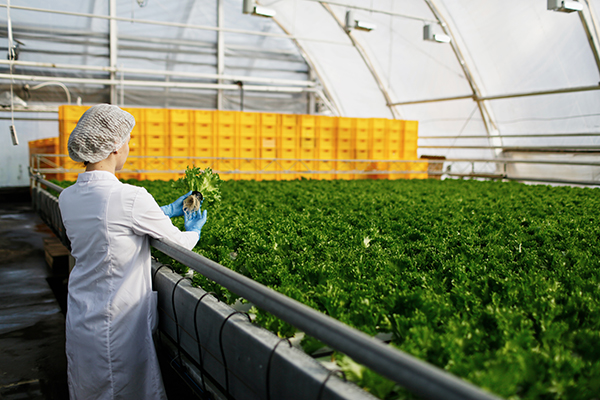Is a Food Safety Culture on your New Year’s Resolutions List?
We hope you all had a wonderful Holiday season and are getting ready for a great new year!
Right before the holiday, I was thinking back to a seminar I sat in on several years ago with an individual, who at the time, was the CEO of Pal’s Sudden Service. If you are not familiar with Pal’s, it’s a regional quick service chain that won the 2001 Malcolm Baldrige National Quality Award in the small business category. I believe this is one of the only restaurant companies to have won the award. The award program is run through the U.S. Department of Commerce National Institute of Standards and Technology and awarded by the President. The program itself was designed to improve and then showcase and drive performance excellence in the U.S. and global economy.
A culture that values doing food safety the “right” way will allow employees to help other employees achieve their best and creates opportunities for open dialogue …
In the session, the CEO was talking about the training that each of the employees receives before ever being in front of a customer. Granted this was a few years ago, but if my memory serves me correctly, each employee received a minimum of 124 hours of training before ever speaking to a guest. As a former restaurant manager, I was astonished, if our employees received 1/15 of that amount of training before speaking to their first guest, I would have been surprised. The CEO went on to say that they preferred that they hired employees who had no experience in any quick service operation, thus eliminating the need to re-train the employees from bad behavior or poor habits that they may have already picked up in the foodservice industry.
After that session, I started to think about training and hiring in a new way. As a young manager, I had never really thought about the need to break the habits and bad behaviors that employees come to us with – even habits that they learned long before they ever started working a foodservice operation. We discussed habits a bit in a previous blog a year or two ago, where I introduced one of my most favorite books, The Power of Habit: Why We Do What We Do in Life and Business by Charles Duhigg, but it is certainly a topic that bears repeating.
When an employee comes to us, regardless of where they learned it, they are bound to bring bad habits into our operation. For example, not washing hands when they should, not washing hands following the proper procedure, or not taking the end-point cooking temperature of a product. All of these issues could lead to a foodborne illness in our business, but employees may not make that connection. For these reasons, it is important to really try to understand why employees do what they do and help them to see why following proper practices is important. In some cases, they may have never washed their hands correctly, and to their knowledge, they have never made someone ill. Food safety training can help make this connection for them, but it won’t solve all of your problems.
This is why we often talk about the importance of a food safety culture within your organization. As we get ready to face a new year, hopefully you’ve included in your business goals to help support or enhance your food safety culture. A culture that values doing food safety the “right” way will allow employees to help other employees achieve their best and creates opportunities for open dialogue about why things are done the way they are. This helps employees who may question why things are done seek clarification and, hopefully, get on board with your culture that supports that nothing is too important that it cannot be done with food safety in mind.
Earlier this month, we posted our most recent SafeBites Webinar, “A Foodservice Operators’ Guide to the Food Code”, be sure to check it out! As a reminder, if you have any topics you’d like to hear about in 2023 or any other food safety questions, please reach out. From all of us at FoodHandler, we wish you a happy and healthy new year! Risk Nothing.
READ MORE POSTS
Changing Climate: The Unseen Impact on Food Safety
In June, I was asked to participate in the Allinfoodz podcast, put on by a colleague, Dr. Amit Sharma, at Penn State University. One of the points Dr. Sharma wanted to discuss was the impact of climate change on food safety, which is something I was certainly aware of, but not something I had done much research on. However, when preparing for the interview and podcast, it was interesting to learn more about the relationship between the two.
Thawing Food with Food Safety in Mind
There comes a time in almost every foodservice operation where you must thaw food. Yes, I know there are those operations who have moved to fresh products only and don’t have a freezer in-house, but I am willing to bet that is more the exception than the norm. I am almost sure that anyone reading this blog who works in a foodservice operation can regurgitate what methods are acceptable to thaw food per the FDA Model Food Code. In case you don’t recall, I will discuss them briefly, but I wanted to spend some time covering these requirements a bit more in-depth – so you not only know WHAT to do, but the WHY we do it that way.
Addressing Major Food Recalls in Your Business
It seems like every year we have a large-scale food recall that reminds consumers and foodservice operators about the importance of food safety. Not that we need reminded, but it certainly puts the topic in the headlines again. Last year, it was the onion recall. This year, it may very well be the Jiff peanut butter recall, of which we are in the midst of. At the time of the publishing, we are starting to learn more about a potential hepatitis A outbreak linked to strawberries. If you have not been impacted by either of these recalls in your personal or business life, I would be surprised.
Sanitation, Sanitation, Where Art Thou?
Continuing the theme I picked up on a few months ago, discussing common causes of foodborne illness, I’d like to focus this blog on cross contamination, more precisely sanitation. Sanitation is another issue that employees don’t often do at home, so they discount the importance of it in the food production environment. That is to say that they have never made someone sick at home because they only clean their countertops and they have likely never sanitized their kitchen, so why is it so important in a foodservice facility?










